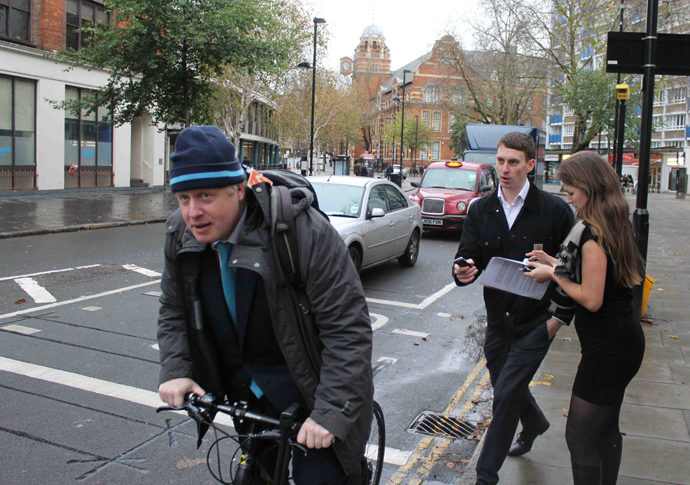Boris bounce and bust
Dan Carrier talks to Andrew Gimson about his analysis of the Johnson years and why the ex-PM is such a divisive figure
Thursday, 29th September 2022 — By Dan Carrier

In pre-PM days, speeding away from questions from our reporter William McClennan
IT was July 2019 when Boris Johnson returned from an audience with Queen Elizabeth II and stood on the steps of Number 10 Downing Street.
He had fulfilled a life-long ambition: asked to form a government, he was sharing his glee with the nation.
For his admirers, he showed the skills that made him a successful political operator. His speech sounded like a rallying cry given by the captain of the Eton Wall Game First XI: “…the doubters, the doomsters, the gloomsters, they are going to get it wrong again, the people who bet against Britain are going to lose their shirts, because we are going to restore trust in our democracy.”
He made more than a dozen pledges, including new hospitals, extra police, new roads and railways that would “answer the plea of forgotten people and the left behind towns by physically and literally renewing the ties that bind us together”.
Three years on, like so much of Johnson’s public and private life, it hasn’t ended well.
Now, three months after Johnson was sacked by Tory MPs, journalist and political commentator Andrew Gimson has written a near-contemporaneous consideration of the Johnson years.
Gimson, who lives in Kentish Town, is well placed. A former Daily Telegraph sketch writer, he had previously published a biography of Johnson in 2006 that has since been updated. He has also written the ultimate bluffer’s guide to the lives of Britain’s PMs. With a sketch-writer’s verve – in tune when considering a figure where pomposity and pratfalls are integral to all he does – Gimson takes the reader through the tumultuous near past.
How does he think Johnson will be judged?
“Ask me again in a century’s time,” says the author.
“If the UK cracks up in the coming decades – which it could do – he will go down in history as the politician who, by campaigning successfully for Brexit, started a chain of events which led to the loss of Scotland and Northern Ireland. But if the UK thrives as a great and independent nation, history will give him the credit for that.”
Gimson’s book is no hatchet job and gives his subject the benefit of the doubt where others would roundly condemn. As well as walk us through what have been a boisterous few years – Brexit, Covid, Russia and Ukraine, not to mention a series of scandals that cast his personality in astonishingly bad light – Gimson considers why Johnson is such a divisive figure.
Many detractors would say no prime minster has been so rotten. Gimson admits flaws and attempts to explain them – and understand why his opponents find them so enraging.
“The great unavoidable function of any PM is to take the blame when things go wrong,” he states.
The book shows Johnson on a never-ending quest to outdo himself for having a dodgy personal life. On a professional level, critics say he faced big questions. He failed to answer them, and made matters much worse. When this translates into the deaths of thousands of people through his inept handling of the early stages of the pandemic, Johnson no longer seems funny.

Andrew Gimson: ‘If politics depends on finding perfect people we might as well give up.’
But, as Gimson explains, he continues to enjoy high levels of support among Conservative Party members. “He does still have an unrivalled ability to make Conservatives feel good about being Conservative,” he says.
“He is a Tory Democrat who proclaims the greatness of Britain, plus measures to improve the lives of the working class. Johnson won over Labour voters in December 2019 by sounding more patriotic than Jeremy Corbyn. Getting Brexit done was at the heart of this, while promising to restore pride and prosperity to parts of the UK long neglected.”
Such things he may proclaim, but without rose-tinted spectacles, he leaves a Britain in a worse place than when he found it. Yet he was sacked not because MPs had fallen out of love with his politics, but because they could see he wasn’t their golden ticket any more in the eyes of the public.
“Third-rate Tory MPs who are no longer in the first flush of youth, and whose self-esteem depends on holding their seats, see no difference between their interests and those of the country,” adds Gimson. “Hence the continual changes in the Conservative Party’s position. It exists to do the nation’s bidding, not to uphold some ideology.”
And as the book reveals, Johnson is not the sort of person to believe the vote of no confidence means he is done.
“He is competitive; there can be no doubt he would like another go at the top job,”says Gimson.
“He will want to prove the ‘herd’ – as he called them – of Tory MPs wrong. He has a gift for putting himself at the centre of any story going. We have not heard the last of him. In the short term, he will repair his finances by giving speeches and writing articles and books for preposterous amounts of money.”
Gimson walks the reader through such landmark moments as the appointment of Dominic Cummings as adviser and that law-breaking trip to Barnard Castle; and we are given juice on Partygate as part of a near daily scandal sheet of cock-ups, lies and incompetence. Yet there are saving graces, he says. “The vaccine development and roll-out were tasks which British scientists and the NHS already had the ability to do superlatively well. Johnson did sensibly agree that this vital task should be kept out of the hands of the Department of Health,” he says.
“He got Brexit done, in a fashion, but not everyone will consider that a saving grace. He has probably done more to entertain people, and contributed a greater number of striking phrases to the language of politics than any of his contemporaries. He has a gift for teasing the prigs, who will not forgive him for it, but for many voters this was wonderfully amusing.”
And Gimson, who describes Johnson as “a man of low seriousness, with more than a touch of greatness about him,” identifies what he believes helped Johnson slither up the greasy pole.
“His greatness, both as a journalist and a politician, consists in seeing faster than his rivals what the story is, and how to say something interesting about it to the widest possible public,” he adds. “He has a certain boldness, bravery and magnanimity. He is a gifted insurgent who was unable, after his general election victory, to make the awkward transition to being the head of the Establishment.”
And when considering the long list of Johnson failures, Gimson argues we have too high expectations. “Nobody’s perfect,” adds the author. “If politics depends on finding perfect people we might as well give up. We are engaged in a search for the lesser of two evils.
“For a time, Johnson seemed less bad than his competitors. This is a point which commentators who see politics in moral terms never grasp. Morality matters, but so does doing the best one can with the distressingly imperfect people who happen to be available.”
• Boris Johnson: The Rise and Fall of a Troublemaker at Number 10 by Andrew Gimson is published this week by Simon & Schuster, £25